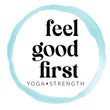If you're a woman in your early to mid-forties, and you're feeling, ahem, not awesome (read: feeling like shit), you may be entering perimenoupause. Perimenopause is characterized by changes in your mentstrual flow and the length of your cycle and sudden hormonal changes. Perimenopause can continue for years, as you don't technically reach menopause until 12 months after your final menstrual period.
If you think you're in perimenopause, there are five areas of your life that I want you to think about. I've spent alot of time in the past months reading and learning how to best support the women that I work with and I've distilled my thoughts down into five important areas, and you'll see how all of these areas are connected with each other. When we say we're feeling low energy, moody, heightened pms-type symptoms and more, we have an opportunity to explore these five areas and experiment with making changes that can have a positive impact on how we're feeling physically, mentally and emotionally. I think it's also important to be honest with ourselves about whether we've been making these areas a priority to help improve how we're feeling or not - no judgement, simply realizing whether our actions are in line with how we want to feel. If we're not feeling great, and we're also not taking care of ourselves then the good new is there's room feel better.
Sleep Sleep is the foundation for everything. It affects our energy levels, our moods, hormones and cravings which in turn affects our ability to maintain a healthy energy balance (think calories in vs. calories out) and maintain our weight over time. Lack of sleep is associated with chronic health morbidities as well as negatively impacting mental health. I recently wrote this post that touches on actionable items to help improve the quality and quantity of your sleep.
Nutrition When we shift the focus away from wanting to lose weight and towards our daily actions, we can get ourselves moving in the right direction and feeling better. It's important to understand our own unique energy needs and after that to prioritize lean protein - creating a rotation of meals that hits the target can help decrease decision fatigue. We need to also understand which foods fall into each of the categories of protein, carbohydrates and fats and within those categories, which foods we want to eat more of to support our bodies.
Movement I truly believe that movement is medicine, and in this phase of life we need a balance of strengthy-type workouts to build muscle and support bones and our metabolism. We also need stress relieving movements to help calm the nervous system and movents that are FUN and help us maintain cardiovascular health. This will look different for each person, and figuring it out it is 100% worth the effort. A mindset shift for movement can be extremely potent: do not wait for motivation, just show up knowing that you will always feel a little bit better and you will never regret that you did. The shift that I implore you to make is to start treating daily movement like brushing your teeth or paying your bills - do it automatically, don't wait for the motivation, don't think about it. Also, know that our movement can directly impact our mental state AND help improve our sleep, which also improves many aspects of our lives.
Mindfulness We can think of mindfulness as practices that we do that bring us into the present moment and away from the things that keep us ruminating about the past or worrying about the future. A basic mindfulness practice can help to calm the nervous sytem and bring us peace we never knew that we had access to. Some of the easiest practices to add to your toolbox are a short, daily gratitude practice, a regular meditation pracite and a regular (even weekly) yoga practice. For years I've written down three points of gratitude into a notebook daily and the sense of contentment its brought me is beyone what I could have expected when I started. Breathing practices can physically stimulate the vagus nerve and change our heart rate and blood pressure within just a few breaths. Yoga, is another great way to be present with the breath and the body and bring the focus into the present moment.
Female Health Think of this category as the container for connecting with your practitioners for your medical care and your holistic care. Please do not be too busy to schedule your physical or your mammograms. If you're continuing to experience physical symptoms of perimenopause a smart Naturopathic Doctor can be an incredible supporter for advice on supplements and nutrition tweaks that you haven't thought of yet. Mine recommended just two supplements to support my hormones, that have completley changed the way I feel. Noticing pelvic concerns like dryness, painful sex or leaking urine when you laugh, cough, jump or sneeze? Run, don't walk to get support from a pelvic health professional, so that you can feel better and live your life.
Navigating symptoms of perimenopause comes down to setting priorities and creating boundaries for ourselves, by focusing on just a few small actions at a time. Being too busy is a choice. Saying I can't is a choice. If you aren't feeling well in perimenopause and beyond, making yourself a priority is the only option because you deserve to feel good and you deserve to function well. After reading this, if you feel like you haven't been making your needs a priority and you could use some support, message me anytime - this is a subject that I'm truly passionate about and would love to point you in the right direction.


